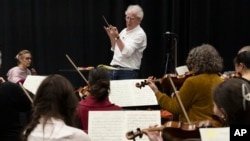Ludwig van Beethoven has long been considered one of the greatest composers of classical music. Critics say that his final complete musical work, the Ninth Symphony, is possibly his best.
The symphony was first performed on May 7, 1824, in Vienna, Austria. Beethoven already had lost his hearing when he was composing the Ninth. He never fully heard the performance himself. And nearly 200 years after the first performance, there is still disagreement over how fast the work should be performed.
Benjamin Zander is the music director of the Boston Philharmonic, a classical music performance group he founded in 1979. The nearly 84-year-old conductor is leading the Boston Philharmonic in a performance on Friday night at Boston’s Symphony Hall. Then, on Sunday afternoon, he will do the same at New York’s Carnegie Hall.
Zander believes that Beethoven’s Ninth Symphony should sound far different than the way it is usually performed. He plans to finish the symphony in less than one hour during the performances in Boston and New York.
“There’s so much information from Beethoven and so little information about how to interpret it,” Zander told the Associated Press.
Zander said he sought advice from violinist and scholar Rudoph Kolisch. In the 1993 issue of The Musical Quarterly, Kolisch discussed how Beethoven marked his work using a metronome, a device that produces a steady beat to help musicians with the speed, or tempo, of musical work.
Beethoven wrote in an 1817 letter that he wanted to drop musical terms like “allegro” for fast, “andante” for slow, or “presto” for extremely fast. He added, the “metronome gives us the best opportunity to do so.”
In 1992, Zander’s recording with the Boston Philharmonic for the music company Pickwick International came in at 57 minutes, 51 seconds. His 2018 recording of the same music was 58 minutes, 39 seconds long.
“For the recording, I really set out to be a devoted servant,” Zander said. He said he had a little statue of Beethoven and looked at it from time to time to see if it was smiling.
Some of the world’s most famous conductors, however, took more time with Beethoven’s Ninth in their performances.
Arturo Toscanini took 65 minutes for RCA Victor with the NBC Symphony Orchestra at Carnegie Hall in 1952; Wilhelm Furtwängler needed 74 minutes at the Bayreuth Festival in 1951; and Leonard Bernstein stretched the music for 78 minutes during his 1989 performance with members of six orchestras to mark the fall of the Berlin Wall.
After Zander’s performance at Carnegie Hall on October 10, 1983, Andrew Porter wrote in the New Yorker, “If Mr. Zander is right, we have been hearing the music of the greatest composer only in misrepresentation.”
Many conductors noted Beethoven’s loss of hearing as a reason to ignore his metronome markings.
James Conlon is the music director of the Los Angeles Opera and main conductor of Italy’s Orchestra RAI. He said, “There are powerful arguments on both sides. I am not against performing Beethoven at the speeds suggested by the metronome.” He added that if the resulting performance lacks expression, emotion, and dynamics, then it should not be followed.
Andrew Price regularly plays oboe with several orchestras in Boston. He said, “The hardest thing is just to keep an open mind about it…All the stuff I learned as a 20-year-old student, I had to go back and relearn it all, just to have a completely different approach.”
I’m Jill Robbins.
Hai Do adapted this report for VOA Learning English from Associated Press and other reporting
______________________________________________________________________
Words in This Story
composer –n. a person who writes music
classical –adj. relating to music of a European tradition including opera and symphony music
conductor –n. a person who leads a band or orchestra
interpret –v. to explain the meaning of something or to perform a work in the way that you understand it
opportunity –n. a chance to do something
devoted –adj. having a strong love or loyalty for someone or something
dynamics –n. (pl.) changes in how loudly a piece of music is played or sung
oboe –n. a musical instrument shaped like a tube that is known as a woodwind instrument
stuff –n. (informal) things
____________________________________________________________________
We want to hear from you.
We have a new comment system. Here is how it works:
- Write your comment in the box.
- Under the box, you can see four images for social media accounts. They are for Disqus, Facebook, Twitter and Google.
- Click on one image and a box appears. Enter the login for your social media account. Or you may create one on the Disqus system. It is the blue circle with “D” on it. It is free.
Each time you return to comment on the Learning English site, you can use your account and see your comments and replies to them. Our comment policy is here.






Forum